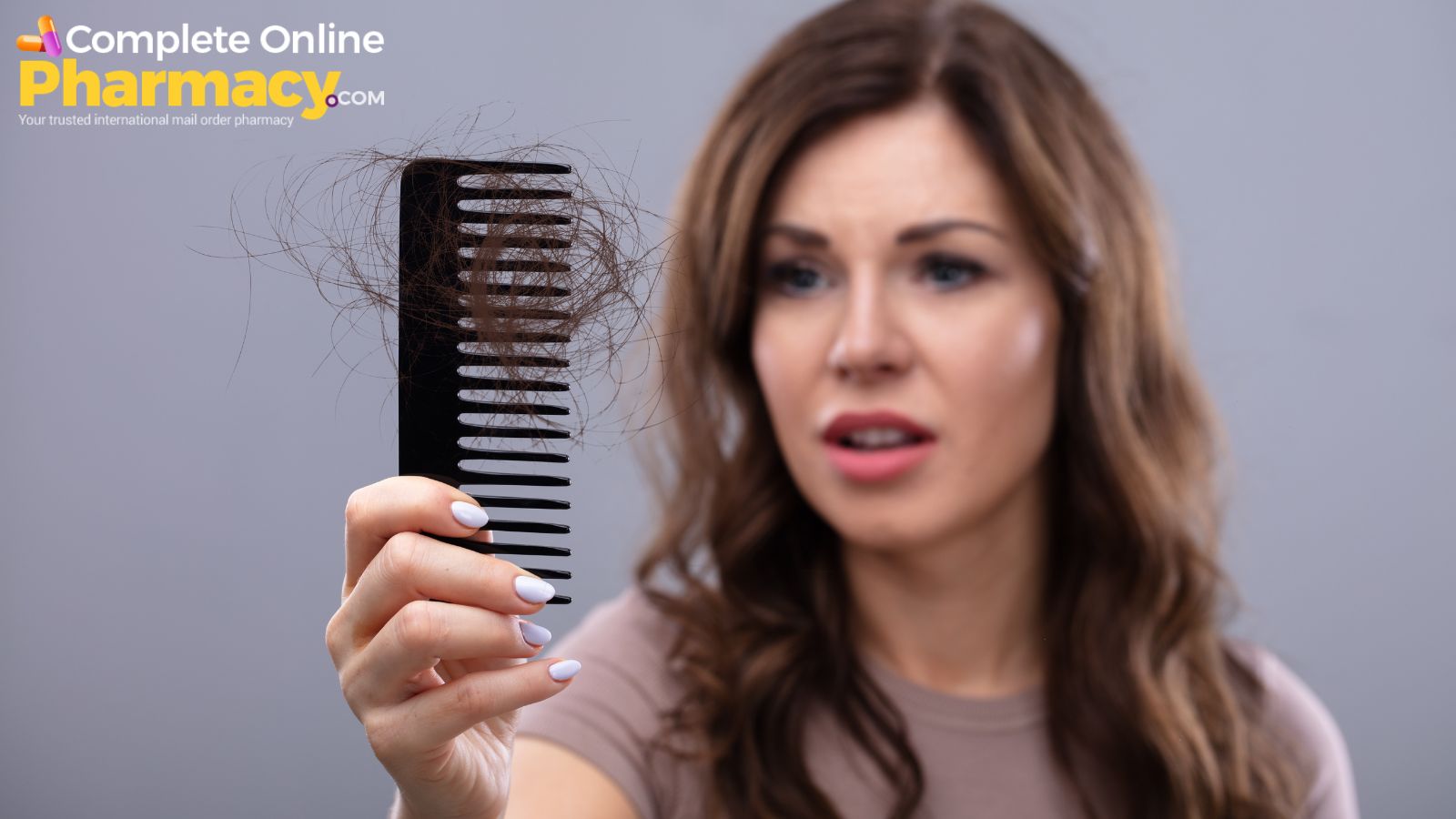US Toll Free : +1-800-897-1053 Call or Fax 9.30 to 5.30 pm EST Mon to Fri.
- Language
- Refer $
- Track Order
- Request a Call Back
- %
- % Coupons and offers
-
0
Your shopping cart is empty!
- Checkout
03/27/2024
The cases of hair loss post-COVID-19 have increased significantly, and it can be very stressful and can hinder your self-confidence. Hair thinning or shedding is linked to various factors, such as hormonal changes, nutritional deficiency, hereditary factors, certain medications, anxiety, and stress. The virus (COVID-19) alone may not be solely responsible for hair loss, but the lifestyle changes and stress it has caused could cause hair thinning and temporary hair loss. Hair shedding and regrowth are normal phenomena; however, if the number of hair regrowth is less than the hair loss, the condition is known as hair loss.
Hair loss after COVID-19 is considered a side effect of the infection. Your doctor will suggest the most beneficial treatment based on the reason for hair loss. The availability of various hair treatment drug solutions online can help minimize hair fall and promote its restoration. Seek your doctor’s assistance on the dosage and tenure of the treatment before taking generic hair loss medications. There could be various other reasons for hair loss apart from COVID-19. Let’s understand hair loss, its causes, and how it can be controlled.

Alopecia, also called hair loss, is a disorder that affects hair regrowth. It could be temporary or permanent and mainly occurs on the scalp but may also occur elsewhere in the body. Losing hair during the hair growth cycle is common, but when the shedding is more than the regrowth, it is termed hair loss. It could happen due to hormonal changes, medical conditions, hereditary factors, and aging.
The different phases in the hair growth cycle are mentioned below:
The growing phase (also known as the Angen Phase)
The resting phase (or Catagen Phase)
The Telogen phase
Under normal conditions, about 90% of the hair remains under the growing phase, 5% is under resting, and the remaining 5% falls. This balance alters under extreme mental or physical stress, and more hair enters the resting phase, leading to hair shedding and loss. Usually, 50 to 100 hairs fall every day, and that’s quite normal. However, post-COVID, this number seems to have increased significantly.
A few reasons linked to hair loss are listed below:
Telogen Effluvium is a disorder in which hair loss and thinning occur 2-3 months post covid infection. The condition is common among females and generally improves in 5 to 6 months with the proper treatment.
It is also called “spot baldness” and is an autoimmune disorder. In such cases, the immune system attacks the hair follicles, causing hair loss in one or more places. The exact cause of this condition is not known; however, it is closely linked to excessive stress and COVID-19.
This is also called Androgenic alopecia. It is widespread and caused by changes in hormone levels, genetics, and aging processes. The risk of hair loss is enhanced if any of the biological parents have suffered from hair loss.
An unhealthy diet or a deficiency of specific vitamins, minerals, and vital nutrients can cause hair loss.
There is increased stress in people who have contracted COVID-19, and stress contributes to the loss of hair.
Individuals with COVID-19 infection were prescribed medications as treatment, and some of these drugs caused side effects, and hair loss is one of them.
Using chemicals, such as hair dyes or straighteners, can also lead to hair loss.
Nicotine in cigarettes narrows the blood vessels and minimizes blood flow to the hair follicles; this may cause loss of hair.
Using heat appliances for a hairstyle can damage the roots of the hair and enhance the risk of hair loss. It could even lead to permanent damage to the hair.
There may be numerous reasons for hair loss other than those listed above.
If you notice any abnormalities, such as excessive loss of hair or any of the below-mentioned symptoms, seek the advice of a dermatologist.
If you experience excessive hair loss, thinning or shedding, itching, pain, or scalp redness, it is important to see a healthcare provider. These symptoms could persist due to an underlying health condition and require adequate treatment.
If you notice hair loss in patches at one or more places on the scalp, it could be due to alopecia areata. A specialist can help you with proper diagnosis and treatment.
If you notice hair loss after recovering from COVID-19 infection, contact your healthcare provider to determine the primary reason for hair loss. Subsequently, appropriate treatment will be advised.
If you notice excessive hair loss, contact your healthcare provider for proper diagnosis and treatment. In addition to treatment, below are a few remedies that promote hair health and prevent hair loss.
Regular, gentle massage of the scalp for a few minutes using your fingertips increases the blood flow and promotes hair growth.
A diet rich in protein, vitamins, and minerals minimizes hair loss and promotes hair growth and healthy skin. Include fresh fruits, vegetables, nuts, fish, and lean meat in your diet.
Massaging the scalp with coconut oil helps moisturize the scalp and promotes hair growth. Onion juice contains sulfur, which strengthens hair follicles, prevents hair loss, and promotes hair growth.
Stress can cause hair loss; try to stay relaxed by doing activities such as yoga, meditation, dancing, cycling, and running. Physical exercises promote the release of “feel-good” hormones called endorphins, which improve mood and help people stay relaxed.
Quality sleep is very essential for your overall health. It is advisable to get 7 to 8 hours of sleep per day.
Harsh chemicals and excess heat from hair styling tools can damage hair, increasing the risk of hair loss. To minimize the risk of hair loss, use hair products that are gentle and contain minimal chemicals.
Hair loss can be disturbing and affect one’s self-esteem and confidence. Post-COVID hair loss can be treated with hair loss medications and a healthy lifestyle. The treatment could vary depending on the root cause of hair loss. Your healthcare provider will suggest the most suitable treatment after assessing your condition, age, sex, and any underlying medical condition. Most of the causes of hair loss can be treated, so seeing a doctor as soon as possible is advisable to prevent the condition from worsening.

Comments